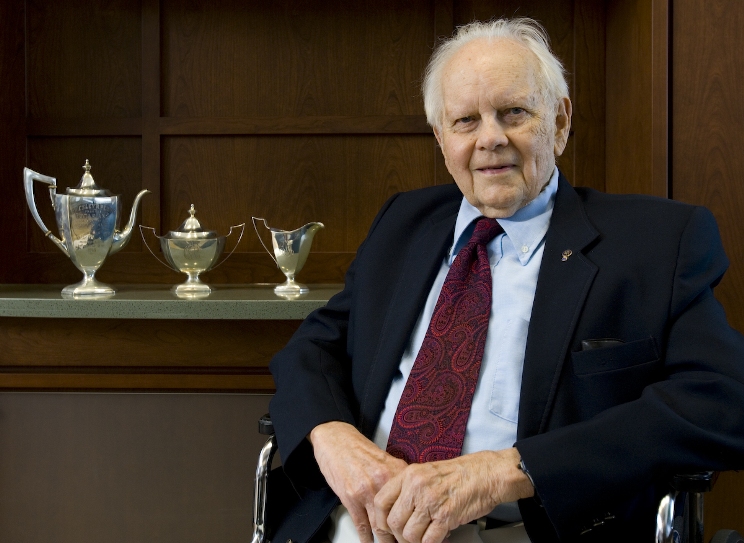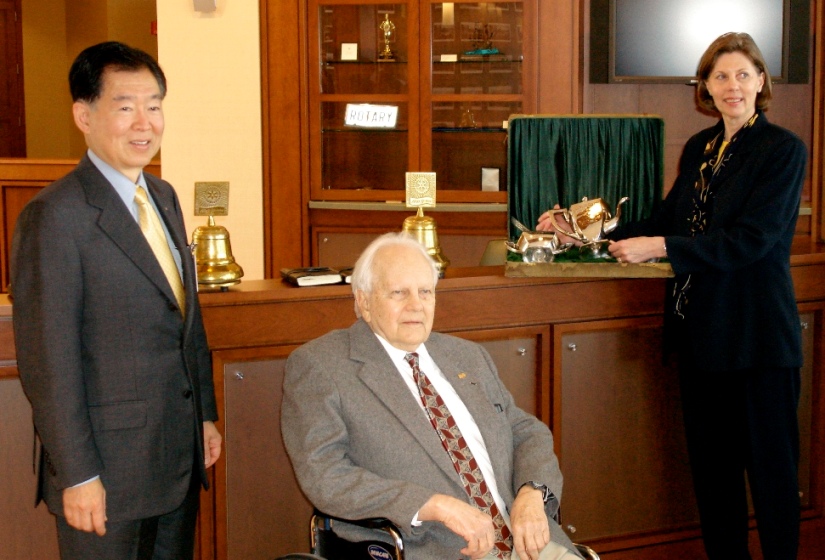| |
|
Richard Harrison ROTARY/One Historian |
| |
| Tea Service originally presented to the
First Secretary of Rotary,
by a group of Southern USA clubs, and represented to
GS Ed Futa in 2006 by
ROTARY/One.
|
|
TEMPEST IN A
COFFEE
POT
ROTARY/One Historian & RGHF Senior Historian -
Richard "'Titch" Harrison
|
|
 |
| |
| |
|

April 2006, David
Templin, Chairman for Archives and later 2007-2009 club
President, called me about a coffee set given to
Ches Perry in 1916. He
wondered if I had found anything about it in Ches’s Rotary file.
Nothing! In 2004, club President “Dick” McKay had asked me to
research and write a biography of Ches, for our Centennial.
Ches had served forty-two years as the Rotary International
General Secretary. It resulted in THE ROTARY LIFE OF CHESLEY
REYNOLDS PERRY published by the club.
David had found the crud
encrusted set on a top shelf, when moving to our new
headquarters in the Union League Club. Member Alfred Koermer
(seen below),
Jeweler, underwrote the cost of cleaning. TO CHESLEY R. PERRY
FROM THE ROTARIANS PRESENT AT THE CONCLAVE OF SOUTHERN ROTARY
CLUBS NEW ORLEANS JAN. 12 and 13 1916 showed up clearly. New
Orleans had joined Rotary in 1910. By 1916, at least
twenty-five clubs had organized below the Mason-Dixon Line. The
sugar bowl and creamer sported Ches’s initials “CRP”.
That same week Ches’s
niece Alice Ledoux, 2004-2005 President of the Santa Ana,
California Rotary club sent me a letter concerning a coffee set
with a different description. She and her mother Barbara Booth
had found the set in Glencoe, Illinois, probably in the house
Ches had occupied with his former wife Jessie Boothe Perry.
Only she in the family added an “e”.
Alice as a young girl remembered
“Aunt Jess as very fat lady with a moustache“. Ches mentioned
Jessie only three times in the files and the very interesting
Booth family never.
Alice remembered that the
set had been given to Ches as a retirement gift. That did not
gibe, as he had left Glencoe before retiring. She obviously
could not read the inscription. They may not have asked Chicago
ROTARY member Herb Angster about it. He had married Jessie’s
sister Blanche. Things got “curiouser and curiouser” as another
Alice lamented.
(Some
Rotary information: Member Herb Angster, whom I knew in 1944 as
very outgoing, Paul Harris, Ches Perry and A.L. White, second
president, from the Chicago club plus Bradford Bullock (NY),
Homer Wood (SF) and Dick Ferris (LA) made up the organizing
committee for the 1910 National Convention.)
I asked club President Evy Alsaker, if she would send a picture
of our set to Alice. I needed extra help. A fall on the subway
re-injured a 1942 war wound. That left me piloting a
wheelchair, which could not squeeze through the door into our
relocated archives. Alice, on seeing the picture, recognized
the sets as one.
On 19 April 2006 Evy and I
presented the set to Ed Futa, General Secretary of Rotary
International, on permanent loan. Also attending David Templin,
Arol Augsburger, Alfred Koermer, Don Garner and probably two or
three other unlogged members. Member Angelo Loumbas handled the
legal work for the “RI Deed of Gift”.
Now, what happened to a
three foot, silver bowling trophy donated by Charlie Newton
member #18. It still remained listed in 1966.
Titch, RI General Secretary Ed Futa, and Past RO President
Evy Alsaker

|
| |
|
Futa, Alsaker, and
Alfred Koermer, a long time Rotarian. (who
underwrote the cleaning) |
|

|
|
|
|
Richard "Titch"
Harrison (seated), LR David Templin, PP 2007-2008; Arol
Augsburger, PP 2008-2009, Evy Alsaker, PP 2005-2006, Robert
Hudson, R/O Foundation Trustee, Alfred Koermer (restored the tea
set) and Don Garner, PP 2006-2007.
|
 |
|
THE BOOTH FAMILY
Alice’s grandfather Sherman Miller Booth II served as attorney
for Frank Lloyd Wright. Her father Knox Booth
acted as executor of Wright’s estate Ravine Bluffs in
Glencoe. But, the patriarch Sherman Miller Booth I,
Alice’s Great Grandfather and Ches’s father-in-Law, rates
several paragraphs. He had attained sixty-two years when
Sherman II was born. Jessie, Ches Perry’s wife, had come
along five years earlier.
The patriarch graduated from Yale University in 1841.
Earlier, he campaigned against the demon rum. As a
senior, he found another passion. The Amistad slaves had
come ashore in Connecticut the year before. Booth’s
professor Josiah Gibbs set up a program teaching the slaves
English and Christianity. Sherman joined the professor at Yale ,
then continued later at Farmington, Connecticut.
June 1841, the Amistad sailed from Havana, Cuba for Guyaba with
42 slaves. In July the slaves mutinied, killing the captain and
the cook. They put the owner in charge during the night.,
at which time he sailed east. At dawn the slaves took over
turning northerly. With the longer summer days, the ship
ended up near Long Island. Spotted by the 10 gun
Brigantine, U.S.S. Washington, a boarding party found a most
improbable organization. The navy ship took the Amistad
into New Haven, Connecticut.
The courts indited the slaves for murder. Former President
and Congressman John Quincy Adams and Roger Baldwin argued their
case clear to the US Supreme Court. The court ruled in
their favor. The survivors returned to Africa with
missionaries in November 1941.
Six years after the Amisted adventure, Sherman took over as
editor of the American Freeman in Prairieville, Wisconsin,
near Milwaukee. In general, the area did not often think
about the slavery matter. Booth spoke to a small but
active minority.
His most interesting exploits
took place in Milwaukee during the 1850 decade.
A run away slave from Missouri, with some noticeable Caucasian
heritage, named Joshua Glover had found employment at a
mill in Racine, Wisconsin. Racine had a station on the Under
ground Railway. An acquaintance of Glover snitched
on him to the Federal authorities. Using the 1893 the
Fugitive Slave Act, as amended in 1850, his owner and two
Federal Marshalls showed up at Joshua’s shack March 1854.
They clubbed and handcuffed Joshua, then hauled him off
bleeding to the Milwaukee jail twenty-five miles away.
Sherman Miller Booth and his now named The Free Democrat saw a
chance for action. A concatenation of events from
National fame though disaster to a presidential pardon became
Booth‘s story.. A local judge issued a Writ of Habeas
Corpus for Glover, which the marshals ignored. Shortly,
about a hundred men from Racine took a ship to Milwaukee.
The crowd picked up as the new comers marched toward jail in
which Glover lay. A myth arose that Booth rode a white
horse on the Milwaukee streets shouting “Freemen to the rescue.“
Although active, he was not that flamboyant. The mob sprung
Glover. He went to Canada. Booth went to jail.
|
|

Sherman Miller Booth
|

Joshua Glover |
Pictures and much of
the information came from an 1898 work LEADING EVENTS OF
WISCONSINS HISTORY by Henry E. Legler.
Booth asked and
received a writ of Habeas Corpus from the Wisconsin Supreme
Court. It declared the Fugitive Slave Act unconstitutional.
The United States Supreme Court reversed the State Court
decision. One reference claimed the Freedom Men then sprung
Booth. This looks like another pretty myth. Instead, he spent
one month in the county jail, paid a $1000 fine and costs.
Piling it on, B.S.
Garland sued and received another $1000 for the loss of the
slave. Although Booth became nationally known, he went into
bankruptcy. Thenceforth, he moved to Chicago. On his last day
in office, President Buchanan pardoned him. In thirteen years
he suffered nineteen trials, twice fined, jailed three times and
spent $35,000 on his defense. Such were the wages of social
protest.
Sherman, the
patriarch, had three families. He first married Margret
Tufts. She and their three offspring died young. The second
wife Mary Corss had three daughters. One died very young, the
other two became estranged from their father making up just
seven years before his death. They moved to his Wisconsin farm.
The third wife Augusta A. Smith gave him five more. This last
group included Alice LeDoux’s grandfather Sherman Miller Booth
II and Jessie Boothe, Ches Perry’s wife. In the next generation
came Alice’s father Knox Booth. Alice’s daughter Laura LeDoux
has followed her mother into Rotary as a member of the
Naperville, Illinois Rotary club.
1 August 2008
|
|

